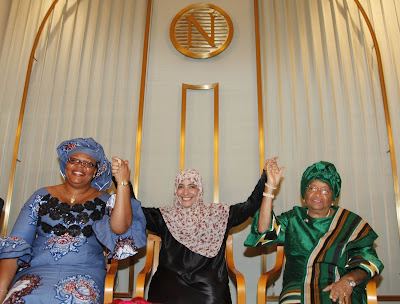
This year the Nobel Peace Prize has been awarded to three women who have worked for peace and women's rights in Liberia and Yemen. They are the Liberian President Ellen Johnson Sirleaf, Liberian peace activist Leymah Roberta Gbowee and Yemeni protest leader Tawakkul Karman.

If there is any whiff of controversy over this year’s choice it settles on the 32-year-old mother of three Tawakkul Karman, who becomes the first Arab woman to win the Nobel Peace Prize, as well as its youngest winner to date.
Karman leads the human rights group Women Journalists without Chains. She has been a leading figure in organizing the protests against President Ali Abdullah Saleh of the Yemen that kicked off in late January as part of a wave of anti-authoritarian revolts known as the ‘Arab Spring’ that have convulsed the Arab world
It is no surprise that men in the male-dominated Yemeni society have reacted in the customary way in such countries by sending death threats to her friends and relatives in an attempt to shut her up. They include when someone told her they would kill her, kidnap her children and throw them from a mountain. On another occasion she was attacked by a female suicide assassin with the traditional curved knife that all men carry in this part of the world.
She has also angered traditionalists by wearing the traditional niqab in favour of more colourful hijabs that show her face. Karman replaced the niqab for the scarf in public on national television to make her point that the full covering is cultural and not dictated by Islam.
She has expressed the view that: Women should stop being or feeling that they are part of the problem and become part of the solution. ‘We have been marginalized for a long time, and now is the time for women to stand up and become active without needing to ask for permission or acceptance. This is the only way we will give back to our society and allow for Yemen to reach the great potentials it has.’
She claims that many Yemeni girls suffer from malnutrition so that boys could be fed and also called attention to high illiteracy rates, which includes two-thirds of Yemeni women. She has also advocated laws that would prevent females younger than 17 from being married.
The Arab Spring has yet to run its course and undoubtedly at the end many despotic rulers will have vanished, but one is left wondering if women’s rights will have advanced one iota.

No comments:
Post a Comment